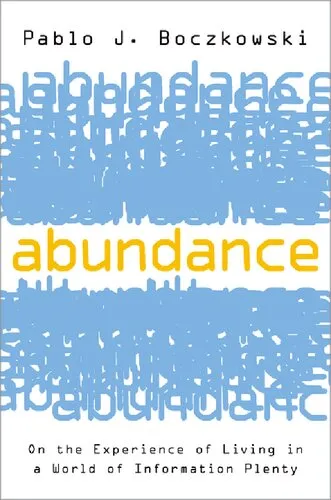Abundance: On the Experience of Living in a World of Information Plenty
4.0
Reviews from our users

You Can Ask your questions from this book's AI after Login
Each download or ask from book AI costs 2 points. To earn more free points, please visit the Points Guide Page and complete some valuable actions.Introduction to "Abundance: On the Experience of Living in a World of Information Plenty"
In today's digital era, we are inundated with an unprecedented flow of information—a phenomenon that shapes the way we perceive the world, interact with others, and understand ourselves. In "Abundance: On the Experience of Living in a World of Information Plenty," Pablo J. Boczkowski explores how this explosion of information impacts both our private and collective lives. Drawing on extensive interdisciplinary research, interviews, and thoughtful reflection, this book demystifies the complexities of living in an age of information abundance.
The abundance of information has drastically transformed our cultural and social landscapes. Boczkowski argues that while this environment offers vast opportunities for connectivity, creativity, and personal growth, it can also amplify challenges such as polarization, misinformation, and a sense of information overload. This book does not merely focus on technological innovations or platforms—it delves deep into the human experience of navigating this reshaped world of plenty.
Detailed Summary of the Book
"Abundance" takes the reader on a journey through the many dimensions of living in a world overflowing with information. The book begins with an overview of how the sheer volume of digital media and connectivity impacts our daily experiences. Boczkowski skillfully combines theoretical insights with personal anecdotes and societal examples to illustrate the nuanced effects of this abundance on individuals and communities.
One of the central themes of the book is how individuals reconcile the boundless availability of information with their limited cognitive, emotional, and social capacities. Boczkowski introduces concepts such as "information fatigue," "interactional scarcity," and "attention prioritization" to explain the dilemmas we face in deciding what to consume and what to ignore. He raises key questions like: How do we determine what is meaningful when we are presented with endless streams of content? How do cultural and political structures adapt—or fail to adapt—to such conditions?
Furthermore, Boczkowski explores the social implications of information abundance, addressing issues such as echo chambers, fragmentation of public discourse, and the role of algorithms in shaping what we see. He contextualizes these phenomena within contemporary debates about democracy and society, illustrating how historical patterns of media evolution provide clues for navigating this modern world. Ultimately, the book offers a reflective lens that encourages readers to critically analyze their relationship with information abundance.
Key Takeaways
- The abundance of information reshapes not only how we consume content but also how we live, make decisions, and interact with one another.
- While information abundance offers opportunities for enhanced connectivity and knowledge, it simultaneously poses challenges such as polarization, misinformation, and cognitive overload.
- Interactional scarcity—a term coined in the book—highlights the tension between our desire for connection and the reality that we can only meaningfully engage with limited interactions.
- Technological innovations like algorithms bring both efficiencies and ethical dilemmas, shaping societal discourse in profound and sometimes unintended ways.
- Critical self-awareness and institutional reform are essential for addressing the challenges posed by living in a world of information plenty.
Famous Quotes from the Book
"Information no longer feels like a scarce resource; instead, it is like air—ever-present and abundant, but often unnoticed until its quality is compromised."
"The paradox of abundance is that, while we have more access to knowledge than ever before, this very excess often leaves us feeling more detached and polarized."
"To live well in an age of information plenty requires not just critical thinking but also emotional and social intelligence."
Why This Book Matters
"Abundance" is a compelling and timely exploration of a crucial topic that defines modern life. With its interdisciplinary approach, combining sociology, psychology, media studies, and cultural critique, the book offers a unique vantage point on how the digital age influences lived experiences. Whether you're a scholar, a media professional, or an everyday digital citizen, this book provides thought-provoking insights that resonate deeply with anyone grappling with the complexities of information abundance.
This book matters because it addresses profound questions about meaning, attention, connection, and trust in an age reshaped by digital media. It invites us to reflect on how we can create a healthier and more reflective relationship with the information-rich world we inhabit. Boczkowski’s thoughtful analysis provides tools for navigating the overwhelming reality of abundance while offering a hopeful vision of how we might better manage and harness it for mutual benefit.
In "Abundance," readers are encouraged to transform passive consumption of information into active engagement with knowledge, community, and self-reflection. This makes the book a vital resource for understanding our present and envisioning a more balanced future.
Free Direct Download
Get Free Access to Download this and other Thousands of Books (Join Now)
For read this book you need PDF Reader Software like Foxit Reader
Accessing books through legal platforms and public libraries not only supports the rights of authors and publishers but also contributes to the sustainability of reading culture. Before downloading, please take a moment to consider these options.
Find this book on other platforms:
WorldCat helps you find books in libraries worldwide.
See ratings, reviews, and discussions on Goodreads.
Find and buy rare or used books on AbeBooks.


